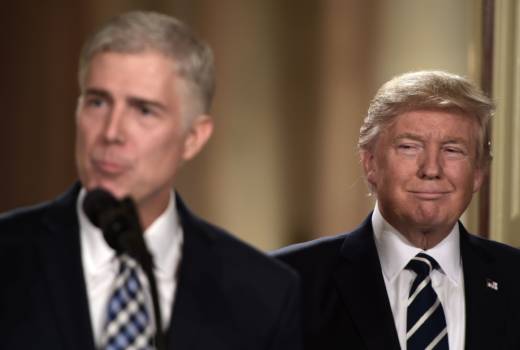Sen. Kamala Harris, on the job less than a month, tweeted that she was "troubled by the nomination."
The selection of Gorsuch signals a philosophical continuation for the court in the wake of the vacancy left by the death of Antonin Scalia last year.
If confirmed, Gorsuch, 49, would be the only Westerner on the court. His tenure as a 10th Circuit Appeals Court judge suggests he'll echo Scalia's legal thinking but with a softer, gentler style that could be more influential on his colleagues than Scalia, whose bluster and personal attacks in dissents alienated other justices.
California has a lot riding on issues that the U.S. Supreme Court could soon take up, and no one has more at stake than public employee unions.
Like Scalia, Neil Gorsuch would likely vote against unions on issues such as Friedrichs v. California Teachers Association, a case that challenged public employee unions' right to force members to pay dues.
Lower courts sided with the CTA. When the case got to the Supreme Court minus Scalia, the justices deadlocked 4-4, leaving in place the 9th U.S. Circuit Court of Appeals decision. But a similar case is likely to bubble up with an outcome that unions won't like.
"I actually see that as a no-brainer," said UC Hastings law professor Rory Little. "The minute a (union dues) case comes up that is a vehicle for this — whether it comes from California or another state —you're going to see it go. I don't think that's even a question."
Another California case the court could soon consider is Peruta v. California. Five California gun owners are challenging the policy of San Diego's sheriff to limit licenses for concealed carry of guns. The high court is expected to decide soon whether to take up this case, which could help answer the question: How limited are Second Amendment rights?
Of course this appointment is really just the warmup, since it won't change the basic liberal-conservative split on the court that existed when Scalia was there.
The real fight comes over the next vacancy, whether it's created by the departure of moderate Justice Anthony Kennedy or liberals Ruth Bader Ginsburg and Stephen Breyer.
Everything is up for grabs then, including abortion, gun control, LGBT rights and more. Expect to see real fireworks then.
But Democrats won't go away quietly. Many senators are still furious that former President Obama's nomination of moderate judge Merrick Garland never received a hearing, much less a vote. But they may decide to keep their powder dry for the next vacancy, which could well shift the court's ideological center to the right.
